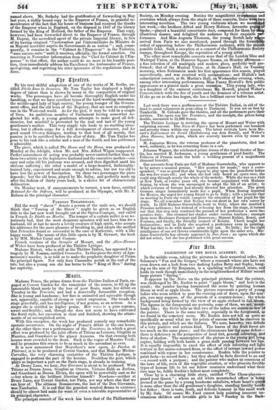Ensit.
Madame Pence' the prima donna from the Theatre Italien of Paris, en- gaged at Covent Garden for the remainder of the season, to fill up the lamentable blank made by the loss of poor Bosio, made her debfit on Tuesday in the Traviata, and had a deservedly favourable reception. Sheis young and handsome ; her face is animated and agreeable though not, apparently, capable of strong or varied expression. She treads the stage gracefully, and has intelligence, if not genius, as an actress. As a singer she is entitled to higher praise. Her voice is a pure soprano, sweet and flexible; and, though she does not seem to have cultivated the florid style, her execution is clear and finished, showing the attain. meats of an accomplished artist.
With this exception, the week has produced scarcely any remarkable operatic occurrence. On the night of Pence's debit at the one house, at the other there was a performance of the Trovatore' in which a great effect was produced by the joint efforts of Titions as Leonora, Giuglini as Manrico, and Guarducci as the gipsey Azucena. On that evening both houses were crowded to the floors. Such is the vogue of Maestro Verdi; and he promises this season to be as much in the ascendant as ever.
It is now announced that Meyerbeer's new opera, Le Pardon de Ploirtnel, is to be produced at Covent Garden, and that Madame Miolan- Carvalho, the very charming' cantatrice of the Theatre Lyrique, is engaged to perform the part of the heroine. Doubtless the goat, which plays so important a part on the Paris stage, is already in training. ± At Drury Lane, we hear, Don Giovanni is about to be produced. With Titiens as Donna Anna, Giuglini as Ottavio, Victoire Balfe as Zerlina, and Guarducci as Donna Elvira, the opera will be powerfully cast so far —but where is the brilliant libertine himself ? Nowhere—neither at Drury Lane, not Covent Garden, nor Paris, nor any where else that we can hear of. The ultimus Romanonim, the last of the Don Giovannis, was Tamburini. It is sad that the grandest musical drama in existence should-be almost laid aside for want of even a tolerable representative of
ite_priicipal character. „ The principal concert of the week has been that of the Philharmonic Society, on Monday evening. Besides the iiiiiiitisent.itympbonies and overtures which always form the staple of these conceits, there vreee two interesting novelties. The two young violinists whom we mentioned last week,—the brothers Alfred and Henry Holmes; favouritepu of Spohr,—played a beautiful coneertante duet, composed for them by illustrious master, and delighted the audience by their exquisite
formance. And Miss Augusta Thomson, the young Scotch_lady se arrival from Paris we also mentioned, passed through the formida lc ordeal of appearing before the Philharmonic audienee, with the utmost possible eclat. Such a reception at a concert of the Phidharnionic Society stamps, throughout Europe, the reputation of a young artist. The other most remarkable concerts were that of the London:Glee and Madrigal Union, at the Hanover Square Rooms, on Monday, afternoon- s fine selection of old madrigals and modern glees, perfectly well per- formed; that of the Musical Union, at St. James's Hall, on Tuesday morning, when Rubinstein made his first appearance this season, played marvellously, and was received with acclamations ; and Hullah's last subscription concert, at St. Martin's Hall, on Wednesday evening, when, among other interesting performances, Miss Fanny Howell's first public appearance as a pianist made a great sensation. This young lady, who is a daughter of the eminent contrabass° Mr. Howell, played Weber's Concert-stuck with the fire of youth and the firmness of a veteran artist. If she go on as she has begun, she has a brilliant career before her.


























 Previous page
Previous page